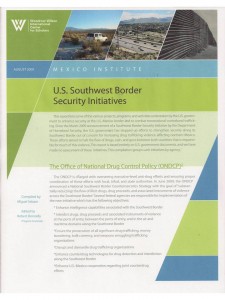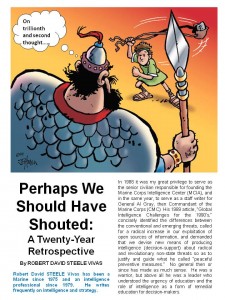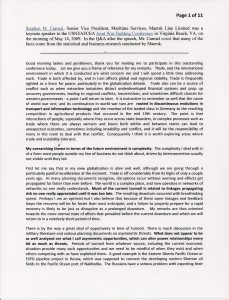
Phi Beta Iota: 100's of personnel, millions of dollars, far short of what has been called for (tens of thousands of personnel, tens of millions of dollars).

Click on the photo for 878 photos covering the beauty and talent paegeant, in which many of the new Republics from Eastern Europe and elsewhere shined.
El pueblo avanca. Con gran carino para el pueblo Venezolano, suladmos as todos, con gran esperanza sobre nuestru futuro espalada a espalda.

The past eight weeks have been the army's worst time in Afghanistan since the US-led invasion eight years ago. Here, in his brutally frank diaries of life on the front line, a serving soldier records the bitter toll of death, and his anger and frustration at the lack of military and political support Mark Townsend The Observer, Sunday 23 August 2009.
EXTRACTS as Highlighted by Chuck Spinney:
We need better weapons. Every one of the SA80s stopped firing after one round (weapons were cleaned and oiled just as we were trained) but these weapons are a load of shit.
The chiefs should be pressing for a better weapons system. And why don't the army have more sniffer dogs? Would be finding IEDs [improvised explosive devices] a lot easier with a furry friend running about and a lot more lives would be saved. Since I've been here, haven't seen one dog. Told might have to go back to Camp Bastion because of injury.

In an era when changes to the Earth that used to take 10,000 years now take three;
In an era when all information in all languages all the time is the non-negotiable first step to achieving holistic understanding of the Earth's system of systems as well as all the chaotic sub-systems;
In an era when the Nordics are far ahead of everyone else in thinking about Multinational, Multiagency, Multidisciplinary, Multidomain Information-Sharing and Sense-Making (M4IS2),
it is helpful to have a sense of what the U.S. Department of Defense is going with respect to it's own Global Information Grid (GIG).
Below are a few headlines as well as pointers to a couple of devastatingly critical reviews from the General Accountability Office (GAO).
Phi Beta Iota has just one question: when, if ever, will DoD plan, program, budget, and implement for a world in which 96% of the information DoD needs to exploit is not secret, not in English, and not originating from a DoD device?
After the GAO reports, click on the Frog Left to read what we said to the National Research Council about the Army Communications Architecture in the early 1990's and Frog Right to read about our recommendations for National Information Infrastructure (NII) cyber-security in the mid-1990's.
DoD needs a Chief Knowledge Oficer (CKO)–someone that knows the difference between knowledge management, network management, content capture and exploitation, and the Holy Grail, organizational intelligence.
Continue reading “Journal: Global Information Grid 2.0 and Counting”
U.S. Military Downplays Qatar Coup Rumors
By Jeff Stein | August 5, 2009
Senior American military officials Wednesday threw cold water on reports of an attempted coup d'etat in Qatar, nerve center for the U.S. military campaigns in Iraq and Afghanistan.
+++++++

Arab Websites Report On Failed Coup Attempt In Qatar
Various Arab websites are reporting on the sudden firing of senior Qatari military officials after they staged a failed coup attempt.
Continue reading “Journal: Coup in Qatar? Middle East Convergences…”

Stephen Carmel is a world-class speaker with a truly compelling story to tell, and after learning about him from his appearance at the USNI/AFCEA Joint War Fighting Conference, we were deeply impressed.
Below we summarize the highlights from his speech, which we have put into a proper document with emphasis added throughout. This is one of the most useful intelligent commercial presentations to government we have every seen.
Highlights of his “prime” or most recent speech are below–although delivered in May, it did not hit critical mass in our circles until just now. Whatever “challenging tone” might be detected below is from Phi Beta Ioto–the speaker is a diplomat.

1) Complexity is the prime challenge. US Government is not trained, equipped, or organized to deal with complexity.
2) Global trade web has zero slack capacity and both the maritime and air webs depend in internal train and truck webs to keep going. US is $20 billion behind in the latter infrastructure.
3) Global trade web runs on computers and with the dependence on just in time inventory handling, has zero slack in the event of disruption, and the easiest as well as the most damaging disruptioin lies with computers and data that can be contaminated, manipulated, or simply destroyed.
4) USG completely missed China's deal with Russia to lock up the Siberian oil supply that is now bonded at the hip with the Chinese refining capacity that was part of the deal–this is a supply not subject to maritime interdiction.

Tip of the hat to Sol Sanders for a pointed review of the USA's lack of a China Strategy or the details that go with it. Below are just three short excerpts, followed by a Comment.
. . . . . . .
Given that the history of U.S.-China relations have always been rocky however intimate they have been since the founding of the American republic, it is self evident that in a period when Beijing’s economic and political clout are increasingly important that they require a high priority for attention – to details. Equally obvious is that given their complexity, they will have to be solved on a largely piecemeal basis – as are almost all political and human problems if and when it is accomplished without violence and tragedy.
. . . . . . .
Rather than splashy dinner parties in Washington, the talents of the huge American diplomatic establishment which Clinton often seems to be only marginally out in front of, it is the nitty-gritty of these myriad problems that ought to be addressed.
Sol W. Sanders, (solsanders@cox.net), is an Asian specialist with more than 25 years in the region, and a former correspondent for Business Week, U.S. News & World Report and United Press International. He writes weekly for World Tribune.com and East-Asia-Intel.com.
+++++++Phi Beta Iota Editorial Comment+++++++
There are ten high-level threats to humanity, and China represents most of them on steroids, notably poverty, infectious disease, and environmental degradation. There are twelve core policies, among them agriculture, energy, and water, and China is again the world's most important “canary.”
The Obama “theater for the masses” is in no way coherent or responsible when it comes to strategy of any sort, much less strategy for dealing with the eight demographic challengers (Brazil, China, India, Indonesia, Iran, Russia, Venezuela, and Wild Cards like the Congo and Turkey.
The “Substance of Governance” is not rocket-science. It merely requires integrity and attention to detail.